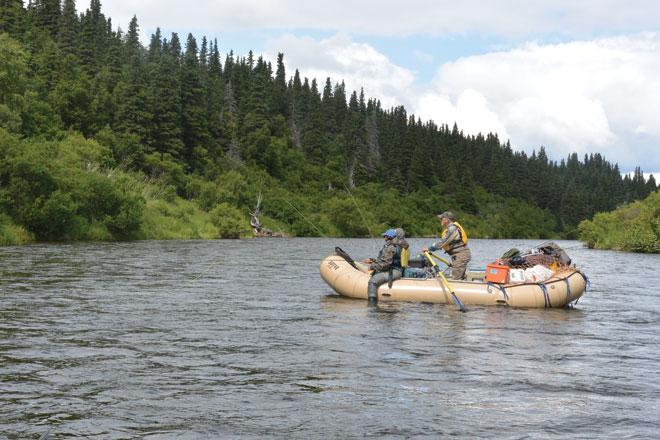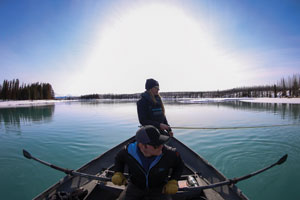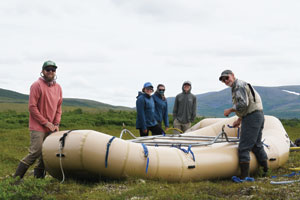Conservation: Helping the Wild Places that Help Us
by Jenny Weis

Chuck Ash on the oars while helping visitors catch fish during a 2018 float trip. © Eric Booton
In 2018, only about half of Americans went outside to recreate, according to a report by the Outdoor Foundation.
As an angler and outdoor enthusiast, the decline in outdoor recreation saddened and somewhat baffled me. I was slightly buoyed by the fact that fishing ranked second place in popularity for children (behind biking), and adults (behind running).
Study authors credited the general decline in outdoor pursuits to an aging population and younger Americans spending more time on electronic devices. Nevertheless, the findings are part of a trend that, if it continues, could have sobering implications for the outdoor places many of us love to fish, hunt, or recreate. If fewer people experience the great outdoors, there will be far fewer that understand its importance, and fewer still that are motivated to act on issues like maintaining public lands, upholding the Clean Water Act, and slowing the impacts of climate change.
Then, early this year, the novel coronavirus pandemic hit. We were instructed to be “socially distant” and couldn’t gather indoors. A March 2020 poll by CivicScience found 43% of Americans said they’d be doing more outdoor activities due to “social distancing” rules.
I’ve noticed the uptick. Formerly ample trail parking lots have become competitive. Parents with cabin fever are taking kids out to burn off extra energy, and friends meet up on a trail rather than at the bars.

Dustin and Dallas Voss of Explore Kenai practice “social distancing” and enjoy a day on the Kenai River in March. © Ben Morris
Chuck Ash, a lifelong outdoorsman and 45-year fishing and adventure guide who moved to the state permanently in 1972 after completing his tour in Vietnam, has watched these swings in Americans’ affinity for the great outdoors throughout his lifetime.
“The natural world is all we have,” he said. “Those values are everything to me. There’s a perspective on real life that you get out there that you don’t get in most other places.”
I caught Ash over the phone while we both “hunkered down” a few miles apart in our Anchorage homes. It happened to be Earth Day.
“One of the lessons that I took away from my time in Vietnam was that time is much more important than money. And time that you spend outdoors is the best time.”
Scientific research spanning from before Ash stepped foot in Vietnam to today has proven that activities like fishing and being outside in nature, or even just viewing nature, helps reduce stress hormones, blood pressure, type II diabetes, and cardiovascular disease. The Alaska Outdoor Alliance has shared research showing kids with Attention-Deficit/Hyperactivity Disorder (ADHD) experience milder symptoms when they play outside in a natural setting; moderately active retirees have significantly lower healthcare costs than sedentary retirees; and exercise has been shown to prevent chronic diseases as effectively as medication.
It makes sense that not only are people venturing outside by necessity now—there’s nowhere else to go—but they’re returning, due to the mental and physical health benefits.
Scrolling through social media feeds, the sentiment most often expressed seems to be the rejuvenation we’ve all discovered by getting outdoors.

Chuck Ash (right) guides a group of college students in southwest Alaska in 2018. © McCarthy Kessler
Ash articulated the appeal of the outdoors easily: “Things are immediate and simple. You’re not living in the past or the future. When you’re living like that, your mind’s in the right place. Your brain chemicals are working, your blood pressure goes down, plus all the physical exercise you get, all the aesthetics that come to you—the visuals, the bird song, the odors—the whole thing.”
It got me thinking. With so many of us finding new or renewed joy and peace being outside and away from life’s worries, will the trend stick and show the numbers of annual outdoor recreationists and anglers rebound and continue to grow? Moreover, as life returns to normal (or some semblance of it), will we collectively remember what the natural spaces gave to us in this time of stress? Will we recognize the importance and band together to ensure our land and waters remain intact for the next time the world faces inevitable challenges?
To Ash, conservation isn’t necessitated by personal gain, and certainly isn’t connected to coronavirus. It has been on his mind for decades. He taught Natural Sciences to high schoolers for 25 years in the Anchorage School District and shared his conservation ethic with clients while guiding trips.
“For me, it’s an ethical position based on reason. If you enjoy the outdoors and you don’t behave according to a conservation ethic, then those places are going to go away, and the activity and all the benefits will go away. You have to take care of it.”
Love and exploration of the outdoors are lifelong for people like Ash, but national and global challenges like the coronavirus pandemic come and go. I must admit, it reassured me to hear from someone older and wiser who could compare what we face today with prior events in history.
“This is nothing new,” he said. “You have to have a perspective and see this as a transient event. Take a look at history and see that these things have happened before.” He recommended talking to grandparents who may have had parents in WWII.
Americans have discovered the scientifically proven physical and mental health benefits of going outside, but Ash hopes they discover the need to safeguard the places providing them those benefits, too.
“If a fisherman is not a natural conservationist then they’re missing the boat. If you don’t take care of the rivers and the fish, and you like to fish, you’re shooting yourself in the foot. They need taking care of.”
I’d reached the end of my interview questions by then. But, consumed with distressing news for much of the day, my mind was at ease listening to Ash regale me with stories of the “salmon dance” from southwest Alaska or being at the mercy of a river in the Brooks Range. He must have sensed my tension regarding the state of the world.
“Know yourself and listen to yourself,” he advised. “Don’t pay attention much to the fear mongers. Have a rational approach to this and think things through. Our mind is one of our best tools.”
As for tackling big problems in nature?
“The actions of individual people are what give me hope,” he said. “That’s where it all starts.”
This blog originally appeared as the Conservation column titled ‘Helping the Wild Places that Help Us’ in the July 2020 issue of Fish Alaska.
